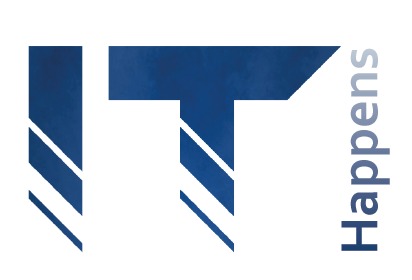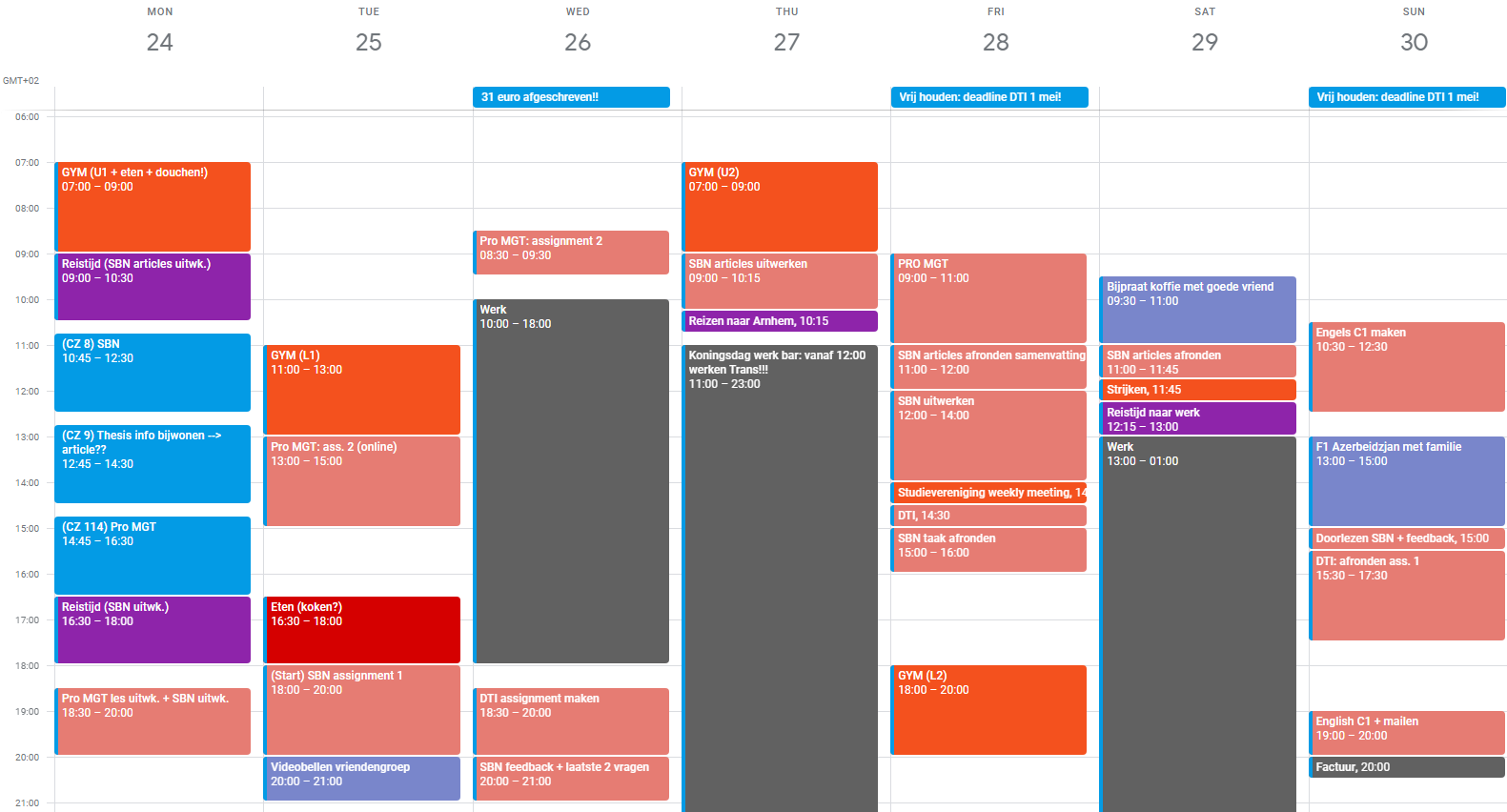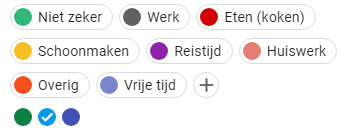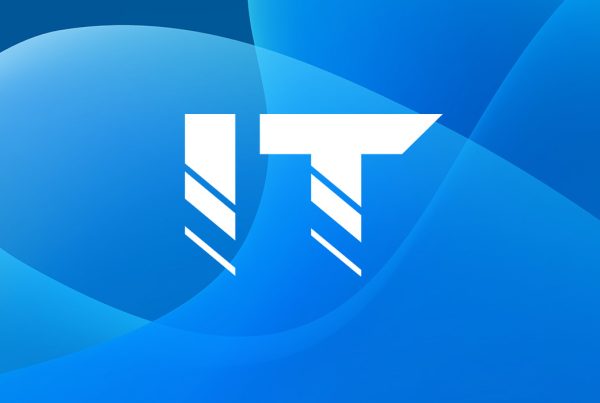Time management: the way to a successful bachelor & (pre)master
The premaster Information Management. It has been one of the busiest times ever in my life without a doubt. ‘Surviving’ the premaster meant a lot of hard work. However, you probably also want to have a social life and focus on earning some money in the meantime as well. Out of experience: passing the premaster was only possible by sufficient time management. This article describes the best ways to organize your time so that you will also pass your specific bachelor’s or (pre)master’s. This article is also available in Dutch.
Why time management is a concern
Time management has become one of the main concerns for students throughout the years. Universities not only demand lots of hours of dedicated work into a (pre) master’s, but the many distractions in a technology-rich digitally-connected world also means a lot of time will dissolve. Prioritizing the tasks that need to be done and balancing them will help to relieve stress, and increase focus on the things that need to be done.
Research on stress has been conducted by several researchers. One of these studies (1) looked at time management in combination with social media usage. Research showed that good time management skills learned at the University contributed to both better scholarly activities as well as excellence in the later phases of students’ lives as professionals (1).
In another study (2), presented in the European Journal of Psychology of Education, research has been conducted towards decreasing stress through better time management. This study entailed an intervention where people with no or very low time management skills were trained on time management. The result: stress levels lowered a lot. This shows that time management (training) might be beneficial for students’ well-being (2).
Sufficient time management skills are therefore not only a very useful skill to possess; they also help lowering stress levels while you keep on working towards that bachelor’s or (pre)master’s degree.
Useful tools to improve time management
Tilburg University offers students free subscriptions to Google Agenda and Google Drive. Therefore, it is very easy to work with this tool. Any other (digital) agenda will work as well, but since Tilburg University offers this service for free, I will elaborate a bit on using this specific tool.
Google agenda: how it helped passing the premaster
The first few weeks of the premaster I scheduled tasks in my WhatsApp. I’m not even kidding. I kept track of everything that I had to do; and I wrote it down in my very-long list of tasks saved in my WhatsApp group consisting of only me. However, after the first two weeks, things started to become uncontrollable. Then I saw some other students using Google Agenda. I decided to also start using this digital tool.
Examples of using Google Agenda
Within Google Agenda, you can create blocks within a specific day/timeframe. For each day, you can for example create tasks that you have to do. I did this by creating a ‘homework’ task with specific details of the things I had to do. I also imported the schedule of the premaster. This way, I could build my tasks around the classes I had to follow. Eventually work and my personal life also ended up in the agenda – but this is a preference of course. If you decide to start using a(n) (digital) agenda as well, you have to try things for yourself and figure out what works for you.
An example of a daily week within the Master’s program is as follows (anonymized because of privacy reasons, and in Dutch because I am Dutch myself):
Explanation of the examples
The different blocks all mean something different. The blue blocks mean a specific class, in which the actual location is added as well. The orange blocks mean ‘other’ activities, such a going to the gym. The grey blocks mean that I have to work at a specific location.
The standard colour the blocks show was light blue for me. I created specific colours for specific tasks, as I mentioned above. You can create any tag/colour combination as you want, to make life easier for yourself. This also creates (for me, at least) an easy overview of the week.
Tips & Tricks for using a(n) (digital) agenda
- Try a different agenda if Google Agenda doesn’t work for you. If you like Apple Agenda, or the Outlook Agenda, this is also sufficient.
- The main point is to use an agenda to make life easier for yourself- if this isn’t the case for you, you can always go back to your old way of working. A physical, paper agenda is also sufficient, for example.
- Become flexible. If you start finding yourself living of your agenda and neglecting your personal life, try implementing blocks of time consisting of ‘free time’.
- Try to go with the flow. In the case of the premaster, your social life will probably be less exiting than before. But I can assure you: the master’s program is way more relaxed and you will have a lot more time to do other stuff. Focusing on the premaster is the main priority for the moment.
- Combine different agendas. It is possible to merge/integrate different agenda’s within Google Agenda.
- For example, Apple Agenda can easily be merged with Google Agenda. This way, you can take advantage of quickly creating tasks within your iPhone for example, while still using Google Agenda as the main agenda.
- Download the app. Google Agenda as well as most other digital agendas offer an app on which you can quickly take a peek at your agenda or change/add blocks. This way, you can use your agenda everywhere and always keep track of time.
- Google Agenda is accessible via calendar.google.com.
- Add descriptions to your tasks/blocks. By adding information to the task/block, you will never lose track of the things thad need to be done or where you have to go.
Conclusion
Using a(n) digital agenda can definitely help passing your bachelor’s or (pre)master’s program. It will probably lower stress levels, and will most likely help you to focus on the things you really have to do. Even though an agenda is only a tool, you should not underestimate its power- it can definitely be the difference of dropping out or ‘surviving’ your program. And of course, any other agenda will also work. Good luck with your bachelor’s or (pre)master’s program!
References – APA
(1) Pursuing Balance and Purpose: Multi-University. Sigma Region 8 Regional Conference (p. 32). Virtual (online): Southern Adventist University.
(2) Häfner, A., Stock, A., & Oberst, V. (2015). Decreasing students’ stress through time management training: an intervention study. European Journal of Psychology of Education, 30(1), 81-94. https://doi.org/10.1007/s10212-014-0229-2






